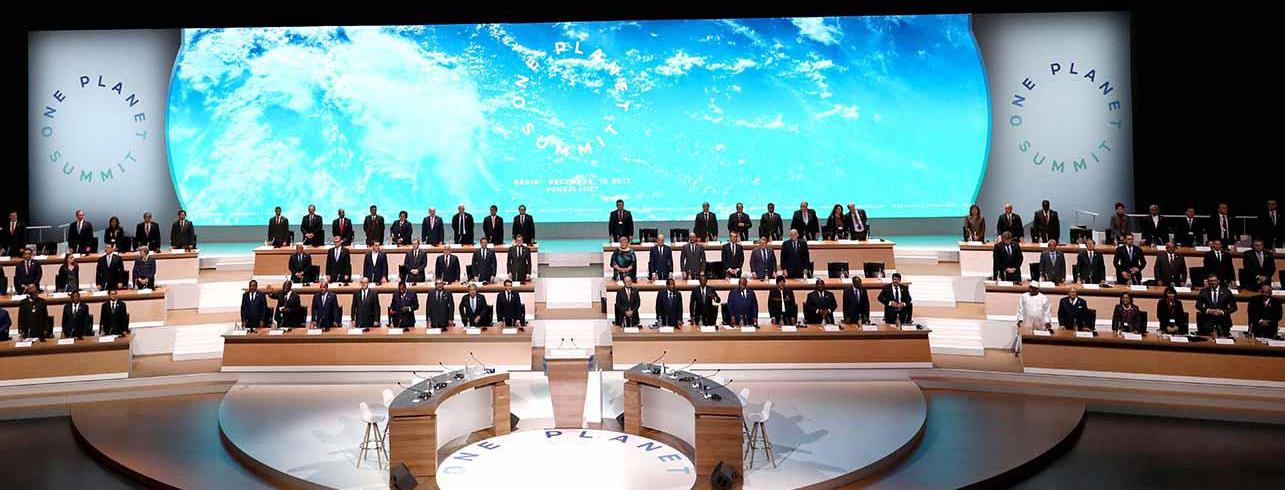From climate targets to converging agendas
In 2017, the promoters of the One Planet Summit, Emmanuel Macron, President of the French Republic, António Guterres, United Nations Secretary-General, and Jim Kim, President of the World Bank, wished to address the somewhat lower priority afforded to tackling climate change in international agendas, because of changing positions on the part of certain key governments. The objective was clear: mobilization for the climate must not falter, unless countries were ready to accept that the battle was lost, with the incalculable damage that would ensue. It was felt that meeting the objectives of the Paris Agreement needed more commitment, more tangible decisions and joint involvement from all those in public life and in business.
The first One Planet Summit was held in Paris on 12 December 2017, exactly two years after the Paris Climate Agreement had been adopted. More than 4,000 participants joined a panel of political leaders, private sector executives, international organizations, financial institutions, foundations, NGOs and citizens. They all committed to take further action, based on 12 transformative climate commitments. The event established the One Planet method, the scope of which was extended at subsequent summits.
The second One Planet Summit took place in New York, in September 2018. It provided an opportunity for an initial review of the 2017 summit. Several innovative collaborations, focused on results, with both public and private sectors, were also launched. A new tool was introduced during this summit, to contribute to the One Planet momentum: the One Planet Lab. Members of this open group included experts and professionals from a variety of backgrounds, and with a wide range of specialties. They all committed to developing and implementing tangible and effective solutions to build an economy that preserves the environment. This new tool would lead to the preparation of several deliverables for the climate summit organized by the United Nations in September 2019.
In March 2019, a regional One Planet summit was organized in Nairobi, to identify innovative solutions for the energy transition and the preservation of forests in Africa. With several Heads of State and Government attending, leaders of the initiatives taken as part of the One Planet movement announced their commitments for the continent.
In January 2021, biodiversity took centre stage for the first time, at the One Planet Summit organized in Paris. The international community was able to raise its ambition levels on environmental protection and to highlight the links between humain, animal and environmental health. New initiatives were launched as a result, to protect terrestrial and marine ecosystems, promote agroecology, raise funds for biodiversity, and also to combat deforestation and prevent future pandemics.
Organized under the French Presidency of the Council of the European Union, the fifth One Planet Summit dedicated to the Ocean was held in Brest from February 9 to 11, 2022. This "One Ocean Summit" brought together more than 100 countries from maritime basins representing more than half of the world's exclusive economic zones, around the "Brest Commitments for the Ocean". States, representatives of civil society and businesses have chosen to work collectively to act in particular to preserve biodiversity, stop overexploitation of marine resources, fight against pollution and mitigate climate change.
The sixth One Planet Summit, co-organized by France and Gabon in Libreville on March 1 and 2, 2023, was entirely devoted to tropical forests. The "One Forest Summit" brought together heads of state and government, international institutions, companies and civil society to discuss the preservation and sustainable management of these forests, which are essential to meeting the challenges of climate change and biodiversity loss. It also promoted North-South solidarity, which is central to the protection of these areas that provide an invaluable service to both local populations and humanity by offering many resources but also by sequestering carbon and hosting biodiversity hotspots.
From 8 to 10 November 2023, the One Planet - Polar Summit was the first international summit dedicated to glaciers and poles. It brought together in Paris the international scientific community, experts, NGOs, indigenous peoples and local communities, together with heads of state and government and international organizations, on the theme of the cryosphere, as part of the Paris Peace Forum. It focused on the protection of these vulnerable glacier and polar regions, vital to climate regulation and the preservation of biodiversity, as well as on the adaptation policies needed to cope with melting ice, notably sea-level rise.

